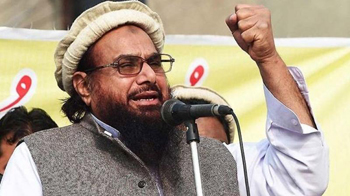Lahore, Jan 31: A defiant JuD chief Hafiz Saeed said his detention would give a "fresh impetus" to the Kashmiris' "struggle against India" as the Mumbai attack mastermind was placed under a 90-day house arrest which the government today indicated could be extended.
 Saeed was detained yesterday at JuD's Lahore headquarters at Masjid Al-Qudsia Chauburji and was later shifted to his Jauhar Town residence which has been declared as a sub-jail by authorities in Punjab province.
Saeed was detained yesterday at JuD's Lahore headquarters at Masjid Al-Qudsia Chauburji and was later shifted to his Jauhar Town residence which has been declared as a sub-jail by authorities in Punjab province.
"The government has detained Saeed and four other JuD and Falaha-i-Insanyat (FIF) leaders for 90 days with effect from January 30 but this detention may further be extended on completion of this period if required," an Interior Ministry official said.
The government may take some further steps against the JuD and its sister organisations in coming days, the official said, adding that the names of several activists of JuD and FIF, a charity run by Saeed, have been placed on Exit Control List (ECL) to stop them from leaving the country.
Saeed and four other JuD leaders were taken into custody and put under house arrest following order of detention was issued by Punjab Province's Interior Ministry yesterday in pursuance to a directive from the Federal Interior Ministry on January 27.
"Although they belong to different districts of Punjab but the government has decided to place them under arrest in one house in Lahore," he said.
Saeed, who was allowed to hold a press conference before he left for his home along with dozens of his supporters amid high police security, said, "My detention order has come from Washington and not Islamabad."
"If someone thinks that placing me under house arrest will help check freedom movement in Kashmir he is living in a fool's paradise. My arrest will give a fresh impetus to the Kashmiris' struggle against India," he said.
68-year-old Saeed further said if Indian Prime Minister Narendra Modi thinks that he would get respite in Kashmir after his arrest he is seriously mistaken.
"We have declared 2017 a year of solidarity for Kashmiris," he said adding that all programmes planned for February 5 will be held across Pakistan and PoK.
He vowed to challenge his house arrest in the Lahore High Court.
Opposition in the Pakistan Punjab Assembly staged a walkout to protest against Saeed's detention.
The opposition, led by cricketer-turned-politican Imran Khan's Pakistan Tehreek-i-Insaf, said the Sharif government has taken the step on the pressure of US President Donald Trump and Modi government.
According to the Punjab Home Department notification, "Both JuD and FIF are engaged in certain activities which could be prejudicial to peace and security and in violation of Pakistan's obligations to the United Nations Security Council Resolution. And accordingly both organisations have been placed in the Second Schedule of Anti-Terrorism Act 1997."
Similarly, it said JuD chief Saeed is engaged in certain activities which could be prejudicial to peace and security.
"He is placed in the Fourth Schedule of Anti-Terrorism Act 1997 and put under detention for a period 90 days," it said.
The interior ministry in separate notification has also put JuD and FIF on the watch list for six months.
Earlier Interior Minister Chaudhry Nisar Ali Khan said the state has taken certain actions against the JuD regarding its obligations to the UNSC resolution.
There have been reports that Islamabad has immense pressure from new US administration to take action against Saeed and his organisations.
Punjab government's action comes amidst pressure on Pakistan from the Trump administration that it must take action against JuD and Saeed to avoid sanctions.
JuD is the front for the banned Lashkar-e-Taiba (LeT) terror outfit which is responsible for numerous terror attacks in India, including the Mumbai terror strike of November 26,2008, which was masterminded by Saeed.
Saeed has already been declared as a foreign terrorist organisation by the United States in June 2014 and is carrying a USD 10 million bounty on his head.
Earlier too Saeed was put under house arrest after the Mumbai attack, but was released about six months later in June 2009 after a court order.






Comments
Add new comment